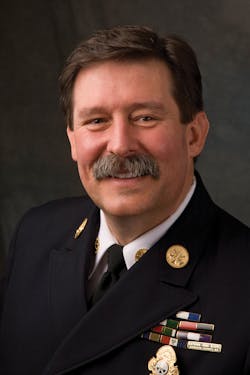Social media has brought new challenges to the fire service. It similarly has challenged the legal system, requiring decades-to-centuries-old legal principles to be applied to this new form of digital communication.
Among the issues that keep resurfacing is whether a fire department can delete offensive and derogatory comments that are posted by the members of the public to its website(s). The question goes to the heart of a complicated dilemma that involves the First Amendment on the one hand and public records laws on the other.
The First Amendment
Under the First Amendment, government cannot censor members of the public by choosing what speech is permissible and what is prohibited. Government actions that limit the ability of the public to freely express their ideas based on the content of that speech violates the First Amendment.
When the First Amendment was enacted in 1791, the intent was to ensure that people have a meaningful opportunity to publicly express their ideas, even if those ideas are unpopular, to others. This right is not limited to speaking inside of one’s own home or to whispering in private locations. The right to free speech is said to exist everywhere, including the town square. In this way, the “town square” became the metaphorical place where people should be able to express their thoughts without fear of reprisal from the government.
How does this relate to social media?
In the digital age, the internet has become the equivalent of the town square. Just as government cannot restrict free speech in the town square, government cannot restrict free speech in cyberspace.
Censorship
Whenever government limits some speech but not others, it runs the risk of violating the First Amendment. For example, if government allows pro-war rallies in the town square but prohibits anti-war rallies (or vice versa), it would be engaging in censorship. However, government can impose reasonable time, place and manner restrictions on speech, provided that the restrictions are content-neutral. As such, government could designate separate dates and times for each group to hold its rally and could prohibit certain activities during the rally, such as the setting of bonfires.
These basic principles apply equally to a government-owned website. Government cannot restrict certain viewpoints by deleting posts while it allows other viewpoints to remain visible. However, much like managing speech in the town square, government can establish reasonable rules for postings, provided that the rules are content-neutral.
Drawing the line between restrictions that are reasonable and those that are not inevitably becomes contentious. Governmental agencies that have a web presence, such as a Facebook page, should have a clear policy about the kinds of posts that will not be tolerated. Such policies (often referred to as moderation policies) commonly prohibit the posting of pornographic content; the use of profanity or threats; the encouragement of illegal activities or the promotion of violence; the use of racial/ethnic slurs; and advertising or posting spam.
A great deal of thought and research must go into a fire department’s online moderation policy. Legal counsel must be involved. The policy should be posted on the agency’s website if possible or made readily available to anyone who asks for a copy. It should be followed consistently by those who are responsible for managing the website. If/when a challenge arises, legal counsel should be consulted immediately. The policy may need to be evaluated and, perhaps, updated if the challenge is upheld.
Managing the moderation policy day-to-day must be done in a consistent manner, but that is easier said than done. Remaining objective when noncomplimentary content is posed can be challenging. One’s instinct may be to find excuses in the moderation policy to justify the removal of posts that criticize while ignoring posts that violate the policy but that are complimentary. These instincts should be resisted, and the free speech rights of the posters should be respected.
Public records laws
Most states define a public record as any record that’s created or received by a governmental employee or agency in the course of business. When enacted in the 1970s, public records were primarily paper, photographs and information on magnetic tape. Today, public records exist in a variety of formats, including digital information.
Posts and comments on governmentally operated social media sites typically meet the definition of a public record. Whether posted by employees or the public, the information must be archived in accordance with the public records laws, and it must be retained for the duration of the applicable record-retention period. The obvious problem is that, unlike a paper record, a website that is open to comment requires continual archiving. The process of archiving posts can be difficult given the fluid nature of online activities. Nonetheless, public records laws make clear that, if a governmental agency plans to have a web presence, it must comply with the public records aspects, and that inevitably requires archiving.
As such, it is important for departments to ensure that all posts—even ones removed for violating website moderation policy—be archived as part of the department’s efforts to comply with public records requirements.
Treated as public record
Departments that have a social media presence must have a moderation policy that complies with the First Amendment. Everything that’s posted to the site, whether by fire personnel or the public, must be treated as a public record. That includes posts that violate a department’s moderation policy. Posts that violate the moderation policy may be removed but still must be archived for public records purposes.

Curt Varone
CURT VARONE has more than 40 years of experience in the fire service, including 29 years as a career firefighter with Providence, RI, retiring as a deputy assistant chief (shift commander). He is a practicing attorney who is licensed in Maine and Rhode Island and served as the director of the Public Fire Protection Division at the NFPA. Varone holds a master's degree in forensic psychology from Arizona Statue University. He is the author of two books, "Legal Considerations for Fire and Emergency Services" and "Fire Officer's Legal Handbook," and remains active as a deputy chief in Exeter, RI.






